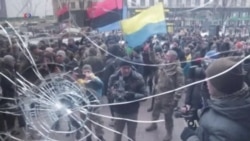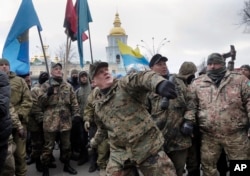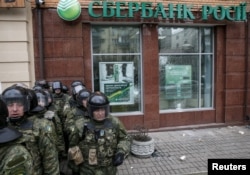Two years ago this month, Ukraine's Maidan Revolution sought to do away with a corrupt oligarchy and put the country on the path toward becoming a Western-style democratic society. But the reform-minded pro-Western government is now under pressure as corruption persists, and Russia shows no signs of letting up in its support for pro-Russian rebels in the country's east.
Demonstrators in Kyiv this month attacked offices of Russian banks, smashing windows and furniture as police looked on. The demonstrators were nationalists, marking the departure two years ago of Russian-backed former President Viktor Yanukovych. But they also expressed anger at the current government for its failure to stamp out corruption and target the oligarchs responsible for it.
Among the offices hit in the protests were those of a company belonging to Rinat Akhmetov, a steel-and-mining magnate who is Ukraine's richest man.
Demonstrators said the reforms of the Maidan, or "Revolution of Dignity," have not gone far enough in tackling corruption and cronyism. They called for another uprising.
Corruption threat
The demonstrations show how far Ukraine has to go, says Transparency International's Yevhen Cherniak.
"People are angry because authorities now — the [higher-ups], the president, the prime minister — people think that they continue corruption traditions in Ukraine. Maidan has sent [a] concrete message to authorities: Stop corruption. But they continue," he told VOA.
"Corruption is the main threat to Ukraine," echoed Sergii Leshchenko, a pro-Western member of Ukraine's parliament.
Leshchenko, an ally of reformist President Petro Poroshenko who spearheads efforts to enact anti-corruption legislation, was part of a team of Ukrainian legislators in London this week to meet with members of the British Parliament on maintaining Western support for Ukraine's anti-corruption efforts.
Like many others in Ukraine, Leshchenko lauds the progress that reforms have made so far, but says the pace needs to be accelerated.
That is a difficult prospect. While some of the oligarchs left Ukraine in 2014 and fled to the West or Russia, enough remained to block more sweeping and thorough changes.
"What happened with most of the oligarchs is that they simply reinvented themselves and found new ways to hold on to power," said Andrew Foxall, director of the Russia Studies Centre at the Henry Jackson Society, a London research organization.
"Some portrayed themselves as regional leaders who could ensure that their regions would not shift toward Moscow as opposed to toward Kyiv. So they became quite important and powerful brokers and gained an awful lot of political leverage in that immediate post-revolution period," he said.
Russian pressure
Meanwhile, Russia keeps up its pressure in rebel-held eastern Ukraine. After a lull that lasted months, fighting has spiked in the past few weeks.
"We see a multiplication of incidents and violations of the cease-fire,” Lamberto Zannier, head of the Organization for Security and Cooperation in Europe, said this month. "We have seen also cases of redeployment of heavy armament."
Some analysts see the on-off nature of the Russian-backed conflict as consistent with what they say is Russia's long-term strategy of seeking to destabilize Kyiv, and to pressure the Ukrainian government to make concessions and improve Moscow's position in future negotiations.
That is the conclusion of Steven Pifer, a senior fellow at the Brookings Institution in Washington, who believes Russia is not yet prepared to reach a settlement of the crisis in terms acceptable to Ukraine.
In a recent report, Pifer said Russia is shifting the intensity of the conflict — but mostly keeping it at a low level — to "allow the Kremlin to ratchet up the conflict at a later point if it desired to further pressure Kiev."
Emboldened by its gains in Syria, Moscow wants to show Ukraine and the West that it can fight two wars at once, some regional analysts say.
Other analysts say improving security in the east depends on Russia, but Moscow is showing no signs of wanting to pull out of the conflict.
U.S. intelligence officials this week indicated there is no end in sight for the turmoil in eastern Ukraine. CIA Director John Brennan told members of the House Intelligence Committee on Thursday that there is "still uncertainty about how the Russians themselves are going to extricate themselves" from the conflict.
The Ukrainian government this month narrowly survived a no-confidence vote in parliament, and frustrations are showing early signs of boiling over again as patience wears thin among those who want corruption and economic disparity gone quickly, and for good.







